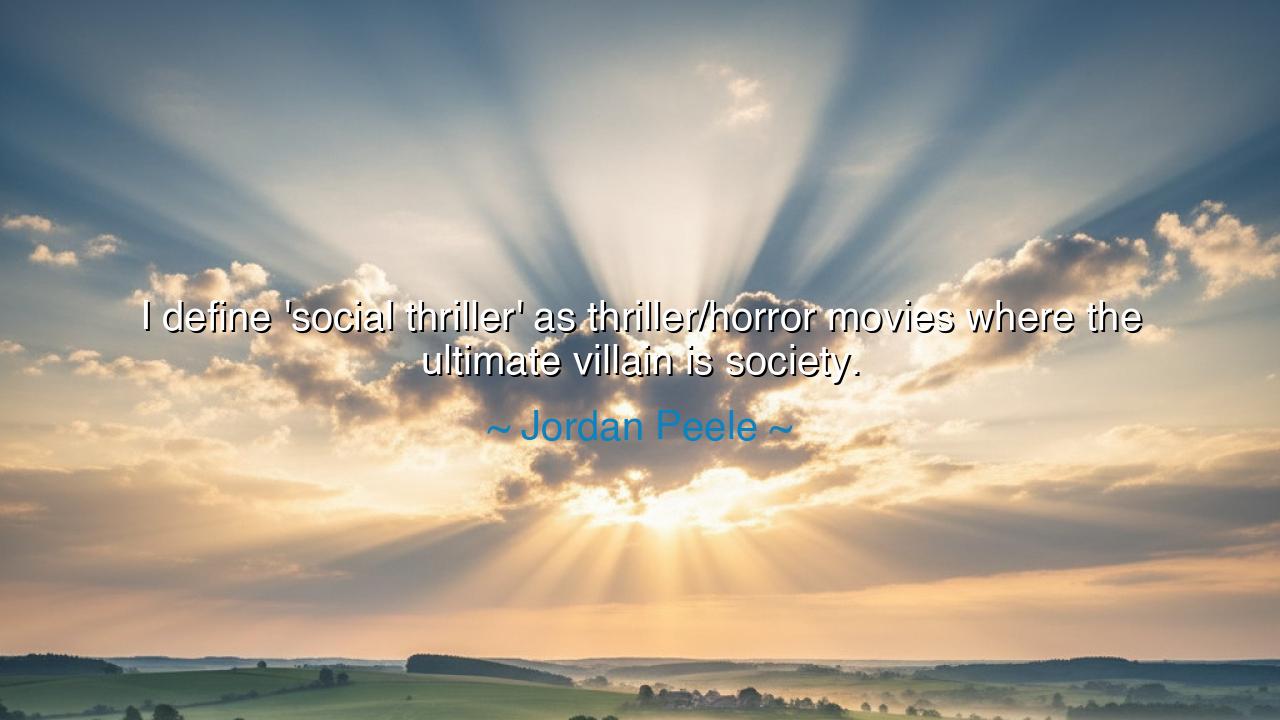
I define 'social thriller' as thriller/horror movies where the
I define 'social thriller' as thriller/horror movies where the ultimate villain is society.






In the great stories that have passed down through the ages, the greatest villains were often those that lurked in the shadows—the monsters, the beasts, and the supernatural forces that seemed beyond human understanding. But in the words of Jordan Peele, we are called to look deeper, for there are monsters far more insidious and far more dangerous than the ones we can see with our eyes. “I define 'social thriller' as thriller/horror movies where the ultimate villain is society.” With these words, Peele beckons us to confront the true horrors of our time—those that are not born of supernatural creatures but of the systems, structures, and attitudes that bind us in invisible chains.
In this light, the villain of the story is not an otherworldly force, but the very society in which we live—a society that is at once nurturing and suffocating, that promises freedom yet often traps its citizens in the confines of prejudice, oppression, and fear. The horror in these tales lies not in the monstrous forms that haunt the characters, but in the social structures that shape their destinies. Peele invites us to ask, what if the greatest evil in the world is not the monster we face on the outside, but the world that we have created within ourselves? The real terror lies not in the things that go bump in the night, but in the systems that silence the vulnerable and exploit the powerless.
History is filled with such social horrors—times when society itself became the greatest threat to the well-being of its people. Consider the ancient Roman Empire, where those in power systematically oppressed the plebeians, using them as mere tools for their own advancement. The gladiators who fought in the arenas were not just fighting beasts, but the very corruption and violence of a system that placed human lives below the thirst for entertainment and control. The real monster was not the lion in the arena, but the empire that treated its people as expendable pawns. It was a society that chewed up its own children for the amusement of the elite, creating a cycle of violence that perpetuated the suffering of those caught within it.
Similarly, apartheid-era South Africa stands as a testament to the horror of society's structure. The villains in this case were not only those who upheld the laws of segregation, but the system itself that allowed such injustice to thrive for so long. It was a society built on a foundation of fear, racism, and dehumanization—a society that told one group of people they were lesser than others simply because of their skin color. The real terror of apartheid was not only the violent enforcement of these laws but the social acceptance of them, as though such inhumanity was normal. It was a society that allowed the worst in humanity to flourish, casting its victims into nightmarish realities that were no less horrifying than the most twisted of fictional monsters.
Peele's vision speaks directly to our own time, as he challenges us to recognize that the evil in our world often comes not from the external threats we fear, but from within the very systems we have created. It is the collective indifference to inequality, the blindness to injustice, and the complacency that allows oppressive structures to endure. The social thriller is a reminder that we are all complicit in the fabric of society, and that our actions—or lack of them—shape the world we inhabit. The monsters we face are not always the ones that claw at our doors, but the forces that drive us to ignore suffering, to accept injustice, and to perpetuate inequality.
Yet, Peele’s message is not one of hopelessness, for he asks us to confront the evil head-on, to challenge the systems that oppress and exploit. Just as the heroes in social thrillers face the horrors of their world, we too must rise up against the social structures that dehumanize and diminish. The fight is not against an external force, but against the attitudes, systems, and institutions that enable prejudice, racism, and inequality to flourish. It is a battle for consciousness, a demand for awareness, and a call to action. Just as those in Peele's films struggle to escape the suffocating grip of society, so too must we fight to create a world where freedom, justice, and equality are not just ideals but realities.
The lesson is clear: we must no longer turn a blind eye to the real monsters in our world. The villains are not always the ones who wear a mask or hide in the shadows; sometimes, they are the institutions and norms that perpetuate the suffering of the innocent. The time has come for us to rise, to face the true horrors of our society, and to demand a world that is just, compassionate, and free from the tyranny of social systems that divide us. It is only by confronting these social nightmares that we can hope to create a future where the true evil no longer has a place to hide.






AAdministratorAdministrator
Welcome, honored guests. Please leave a comment, we will respond soon